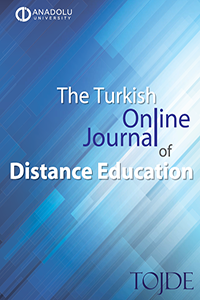Abstract
References
- Anderson, C. M. & Stewart, S. (1988). Para dominar la resistencia. Guia practica de terapia familiar. Buenos Aires: Amorrortu editores.
- Area, M. & Gonzalez, C. S. (2015). De la ensenanza con libros de texto al aprendizaje en espacios online gamificados. Educatio Siglo XXI, 33(3), 15-38. http://dx.doi.org/10.6018/j/240791
- Bagozzi, R. P. & Lee, K. H. (1999). Consumer resistance to, and acceptance of, innovations. Advances in Consumer Research, 26, 218-225. http://acrwebsite.org/volumes/7902/volumes/v26/NA-26
- Barbera, E., Gomez, P. & Fernandez, F. (2016). A cross-national study of teacher’s perceptions of online learning success. Open Learning: The Journal of Open, Distance and e-learning, 31(1), 25-41. http:// dx.doi.org/10.1080/02680513.2016.1151350
- Bertot, J., Jaeger, P. & Hansen, D. (2012). The impact of polices on government social media usage: Issues, challenges, and recommendations. Government Information Quarterly, 29(1), 30-40. http://dx.doi. org/10.1016/j.giq.2011.04.004.
- Black, N., Lockett, A., Ennew, C., Winklhofer, H. & McKechnie, S. (2002). Modelling consumer choice of distribution channels: an illustration from financial services. International Journal Of Bank Marketing, 20(4), 161-173. http://dx.doi.org/10.1108/02652320210432945.
- Bozkurt, A. (2019). Intellectual roots of distance education: a progressive knowledge domain analysis. Distance Education, 40(4), 497-514. https://doi.org/10.1080/01587919.2019.1681894
- Callary, B., Culver, D., Werthner, P. & Bales, J. (2014). An Overview of Seven National High Performance Coach Education Programs. International Sport Coaching Journal, 1(3), 152-164. http://dx.doi. org/10.1123/iscj.2014-0094
- Caruth, G. D & Caruth, D. L. (2013). Understanding resistance to change: A challenge for Universities. Turkish Online Journal of Distance Education, 14(2), 12-21. http://tojde.anadolu.edu.tr
- Chang, H. & Chuang, S. (2011). Social capital and individual motivations on knowledge sharing: Participant involvement as a moderator. Information & Management, 48(1), 9-18.
- Chaouali, W., Souiden, N. & Ladhari, R. (2017). Explaining adoption of mobile banking with the theory of trying, general self-confidence and cynicism. Journal of Retailing and Consumer Services, 35, 57-67.
Abstract
The study is aimed at training sports technicians in the Spanish state. Currently, most of them are in
transitory period. For research, the Theory of Resistance in Innovation has been considered. This theory
proposes a functional dimension and a psychological dimension with five factors: (Use, value of the product
and risks involved) and (elements associated with traditional beliefs and those related to the image). The
context studied was the courses taken by the Royal Spanish Skating Federation. The methodology followed
in this research is empirical-analytical with a non-experimental approach. It will be basically a descriptive
investigation. For this, an ad-hoc instrument was constructed with quantitative and qualitative response
items. Among the results, it is worth highlighting the significant differences existing in students with
experience in distance learning in the variable of acceptance of new technologies. In the qualitative part, it is
recognized that the online mode allows to apply the knowledge immediately although there are difficulties
during the first weeks. The creation of the figure of a tutor is proposed, which will catalyze the introduction
to students’ courses, facilitating the use of the platform before the start of the course.
References
- Anderson, C. M. & Stewart, S. (1988). Para dominar la resistencia. Guia practica de terapia familiar. Buenos Aires: Amorrortu editores.
- Area, M. & Gonzalez, C. S. (2015). De la ensenanza con libros de texto al aprendizaje en espacios online gamificados. Educatio Siglo XXI, 33(3), 15-38. http://dx.doi.org/10.6018/j/240791
- Bagozzi, R. P. & Lee, K. H. (1999). Consumer resistance to, and acceptance of, innovations. Advances in Consumer Research, 26, 218-225. http://acrwebsite.org/volumes/7902/volumes/v26/NA-26
- Barbera, E., Gomez, P. & Fernandez, F. (2016). A cross-national study of teacher’s perceptions of online learning success. Open Learning: The Journal of Open, Distance and e-learning, 31(1), 25-41. http:// dx.doi.org/10.1080/02680513.2016.1151350
- Bertot, J., Jaeger, P. & Hansen, D. (2012). The impact of polices on government social media usage: Issues, challenges, and recommendations. Government Information Quarterly, 29(1), 30-40. http://dx.doi. org/10.1016/j.giq.2011.04.004.
- Black, N., Lockett, A., Ennew, C., Winklhofer, H. & McKechnie, S. (2002). Modelling consumer choice of distribution channels: an illustration from financial services. International Journal Of Bank Marketing, 20(4), 161-173. http://dx.doi.org/10.1108/02652320210432945.
- Bozkurt, A. (2019). Intellectual roots of distance education: a progressive knowledge domain analysis. Distance Education, 40(4), 497-514. https://doi.org/10.1080/01587919.2019.1681894
- Callary, B., Culver, D., Werthner, P. & Bales, J. (2014). An Overview of Seven National High Performance Coach Education Programs. International Sport Coaching Journal, 1(3), 152-164. http://dx.doi. org/10.1123/iscj.2014-0094
- Caruth, G. D & Caruth, D. L. (2013). Understanding resistance to change: A challenge for Universities. Turkish Online Journal of Distance Education, 14(2), 12-21. http://tojde.anadolu.edu.tr
- Chang, H. & Chuang, S. (2011). Social capital and individual motivations on knowledge sharing: Participant involvement as a moderator. Information & Management, 48(1), 9-18.
- Chaouali, W., Souiden, N. & Ladhari, R. (2017). Explaining adoption of mobile banking with the theory of trying, general self-confidence and cynicism. Journal of Retailing and Consumer Services, 35, 57-67.
Details
| Primary Language | English |
|---|---|
| Journal Section | Articles |
| Authors | |
| Publication Date | October 1, 2020 |
| Submission Date | December 4, 2019 |
| Published in Issue | Year 2020 Volume: 21 Issue: 4 |


